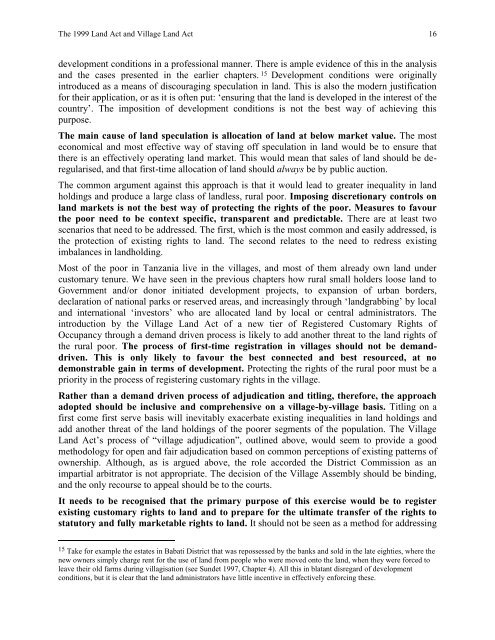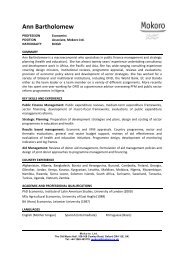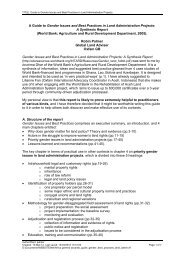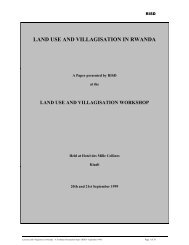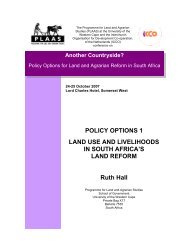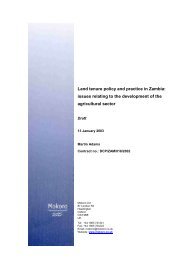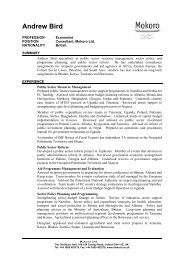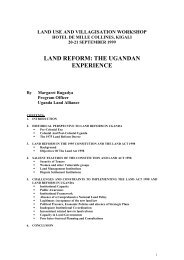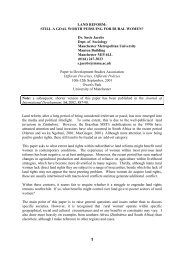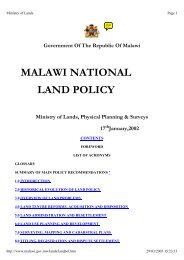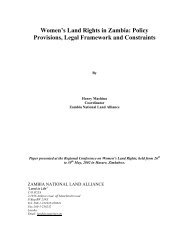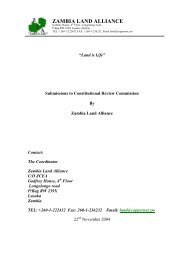The 1999 Land Act and Village Land Act - Mokoro
The 1999 Land Act and Village Land Act - Mokoro
The 1999 Land Act and Village Land Act - Mokoro
You also want an ePaper? Increase the reach of your titles
YUMPU automatically turns print PDFs into web optimized ePapers that Google loves.
<strong>The</strong> <strong>1999</strong> <strong>L<strong>and</strong></strong> <strong>Act</strong> <strong>and</strong> <strong>Village</strong> <strong>L<strong>and</strong></strong> <strong>Act</strong> 16development conditions in a professional manner. <strong>The</strong>re is ample evidence of this in the analysis<strong>and</strong> the cases presented in the earlier chapters. 15 Development conditions were originallyintroduced as a means of discouraging speculation in l<strong>and</strong>. This is also the modern justificationfor their application, or as it is often put: ‘ensuring that the l<strong>and</strong> is developed in the interest of thecountry’. <strong>The</strong> imposition of development conditions is not the best way of achieving thispurpose.<strong>The</strong> main cause of l<strong>and</strong> speculation is allocation of l<strong>and</strong> at below market value. <strong>The</strong> mosteconomical <strong>and</strong> most effective way of staving off speculation in l<strong>and</strong> would be to ensure thatthere is an effectively operating l<strong>and</strong> market. This would mean that sales of l<strong>and</strong> should be deregularised,<strong>and</strong> that first-time allocation of l<strong>and</strong> should always be by public auction.<strong>The</strong> common argument against this approach is that it would lead to greater inequality in l<strong>and</strong>holdings <strong>and</strong> produce a large class of l<strong>and</strong>less, rural poor. Imposing discretionary controls onl<strong>and</strong> markets is not the best way of protecting the rights of the poor. Measures to favourthe poor need to be context specific, transparent <strong>and</strong> predictable. <strong>The</strong>re are at least twoscenarios that need to be addressed. <strong>The</strong> first, which is the most common <strong>and</strong> easily addressed, isthe protection of existing rights to l<strong>and</strong>. <strong>The</strong> second relates to the need to redress existingimbalances in l<strong>and</strong>holding.Most of the poor in Tanzania live in the villages, <strong>and</strong> most of them already own l<strong>and</strong> undercustomary tenure. We have seen in the previous chapters how rural small holders loose l<strong>and</strong> toGovernment <strong>and</strong>/or donor initiated development projects, to expansion of urban borders,declaration of national parks or reserved areas, <strong>and</strong> increasingly through ‘l<strong>and</strong>grabbing’ by local<strong>and</strong> international ‘investors’ who are allocated l<strong>and</strong> by local or central administrators. <strong>The</strong>introduction by the <strong>Village</strong> <strong>L<strong>and</strong></strong> <strong>Act</strong> of a new tier of Registered Customary Rights ofOccupancy through a dem<strong>and</strong> driven process is likely to add another threat to the l<strong>and</strong> rights ofthe rural poor. <strong>The</strong> process of first-time registration in villages should not be dem<strong>and</strong>driven.This is only likely to favour the best connected <strong>and</strong> best resourced, at nodemonstrable gain in terms of development. Protecting the rights of the rural poor must be apriority in the process of registering customary rights in the village.Rather than a dem<strong>and</strong> driven process of adjudication <strong>and</strong> titling, therefore, the approachadopted should be inclusive <strong>and</strong> comprehensive on a village-by-village basis. Titling on afirst come first serve basis will inevitably exacerbate existing inequalities in l<strong>and</strong> holdings <strong>and</strong>add another threat of the l<strong>and</strong> holdings of the poorer segments of the population. <strong>The</strong> <strong>Village</strong><strong>L<strong>and</strong></strong> <strong>Act</strong>’s process of “village adjudication”, outlined above, would seem to provide a goodmethodology for open <strong>and</strong> fair adjudication based on common perceptions of existing patterns ofownership. Although, as is argued above, the role accorded the District Commission as animpartial arbitrator is not appropriate. <strong>The</strong> decision of the <strong>Village</strong> Assembly should be binding,<strong>and</strong> the only recourse to appeal should be to the courts.It needs to be recognised that the primary purpose of this exercise would be to registerexisting customary rights to l<strong>and</strong> <strong>and</strong> to prepare for the ultimate transfer of the rights tostatutory <strong>and</strong> fully marketable rights to l<strong>and</strong>. It should not be seen as a method for addressing15 Take for example the estates in Babati District that was repossessed by the banks <strong>and</strong> sold in the late eighties, where thenew owners simply charge rent for the use of l<strong>and</strong> from people who were moved onto the l<strong>and</strong>, when they were forced toleave their old farms during villagisation (see Sundet 1997, Chapter 4). All this in blatant disregard of developmentconditions, but it is clear that the l<strong>and</strong> administrators have little incentive in effectively enforcing these.


